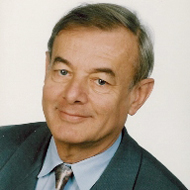Neumann Věroslav
- Year of Birth - Death :
- 1931 - 2006
Biography
The composer Veroslav Neumann gained his formal music education in composition at the Prague Academy of Performing Arts under Jaroslav Ridky. Parallel to this he learned from practical experience, which was no less significant for his development as a creative personality; collaboration with a whole range of amateur and professional ensembles and later teaching assisted this contemplative composer, modern in his thoughts and sentiments, in finding his personal language on a highly professional level in chamber and symphonic music, but also in not so elaborate forms determined for young and amateur music-makers.
It is no coincidence that a considerable share of his work is represented by vocal compositions, and among them the most numerous are songs, choruses, and songs or choral cycles for children in various age groups and of diverse standards of accomplishment. His choral works for adults, for instance "Deserted Ariadna' s Lament", the mixed choruses "In Memoriam Pablo Neruda", "Soleils Couchants" (Setting Suns), "Atlantis" and others are also of no small significance. Some of these works have been conceived as multi-lingual pieces which facilitates their performances elsewhere in the world. Neumann' s vocal works are striking in their originality, while the musical aspects are profoundly effective. High appreciation has been accorded to his chorus "Soleils Couchants" at the International Choral Competition in Tours (1982), he was awarded prizes at the World Festivals of Democratic Youth and Students in Warsaw (1955) and in Helsinki (1962); more recently the Prague-based Panton Publishing House award went to Veroslav Neumann for his "Songs of Defiance and Strength" (1987) and the Union of Czech Composers and Concert Artists prize was awarded to him for his "Atlantis" (1987). Many of his songs for children have been included in various anthologies in the USSR and the German Democratic Republic where they have become a permanent feature on the repertoires of local choirs.
An intimate knowledge of instruments as well as of the potentials and mentality of young instrumentalists have stimulated Neumann in writing instructive works for diverse instruments and chamber ensembles.
Veroslav Neumann began tu turn his attention to symphonic and chamber works systematically later, at a mature creative stage. Here again there is marked evidence of his desire to be communicative in his musical expression, of his endeavour to impart to the listener in an intelligible way the prevailing complicated language of music. A clearly positive response to his String Quartet, organ compositions, Symphonic Dances and other works, some of which met with appreciation in Czechoslovak competitions, have proved his approach to be successful.
A specific feature of Neumann's work is his intelligent wit which he has shown to good advantage equally in his thirty-minute "Chimney Opera" and in his shorter forms even in mixed choruses, which are traditionally considered to be no laughing matters. The humour combined with his singular demonstration of feelings and expression in both his lyrical and dramatic works point to important characteristics in Veroslav Neumann's compositions which are interesting from not a few points of view.
© 2012-2025 Musicbase.cz
Webdesign & hosting Nux Ltd.
Information about web | Sitemap | RSS | Statistics | CMS
Contact information
Music information center, o.p.s.
tel: 257 312 422 | e-mail: his@musica.cz

